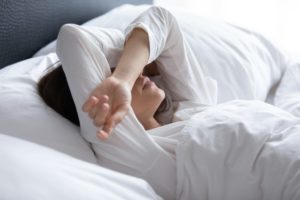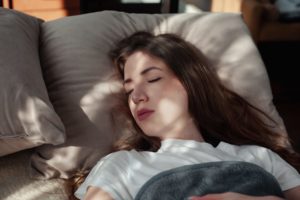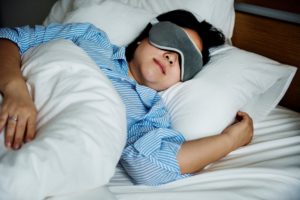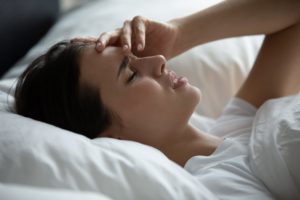Do Dreams Impact Sleep Quality?
Most people have experienced nightmares at some point . These nightmares may have disrupted your sleep, causing you to wake up in a sweat or with a rapid heartbeat. As a result, you may wonder if dreams in general can impact sleep quality. We explore how dreams and nightmares impact sleep quality, as well as what causes bad dreams and how dreams impact waking life.
How Does Dreaming Affect Sleep?
During sleep, people cycle through stages of light sleep, deep sleep, and rapid eye movement (REM) sleep . Although dreaming can occur in any sleep stage, it’s most often associated with REM sleep, which occurs in longer stints toward the end of the night. REM sleep is associated with vivid imagery, and about 20 to 25 percent of a typical night of sleep is REM sleep. Emerging research suggests that people who are woken up while dreaming tend to feel as if they were sleeping more deeply .
Conversely, people who are woken up from lighter stages of sleep that don’t typically involve dreaming may not even realize they were sleeping at all. This misperception of feeling awake while asleep is called “paradoxical insomnia” and also occurs in some people during deep sleep stages, which are also less likely to involve dreams.
The type of dream from which a person wakes up may also impact their perception of their sleep quality. Specifically, more vivid and involved dreams may make a person feel as if they’ve slept more deeply compared to dreams that are less involved. However, having frequent nightmares may be linked to a subjective sense of lower sleep quality .
More research is needed to understand how dreams and sleep quality affect one another. Sleep experts suspect that studying dreams could help researchers gain a more complete understanding of subjective sleep quality.
Will Good Sleep Lead to Good Dreams?
Limited research suggests that nightmares and bad dreams occur more often among people with poor sleep . People with the sleep disorders insomnia and narcolepsy tend to have more negative dreams than those without the disorders. Similarly, having nightmares may disrupt sleep. So, it appears that poor sleep can make bad dreams more likely, and bad dreams can potentially worsen sleep.
More research is needed to determine if the reverse is true, if good sleep leads to better dreams. Surprisingly, one study comparing the dreams of good sleepers versus poor sleepers found that good sleepers’ dreams tend to more frequently contain negative emotions than positive ones. However, poor sleepers in the study experienced more intense negative emotions in their dreams and were more likely to have nightmares.
Sleep experts often recommend improving sleep hygiene in order to have fewer nightmares. Along the same lines, habits like adopting a regular sleep schedule and bedtime routine may help regulate progression through the sleep stages, ensuring a healthy amount of REM sleep and upping the chances of having good dreams .

What Causes Bad Dreams?
Experts think many factors may cause a person to experience bad dreams or nightmares.
- Daily life events: Dreams may be a way for people to process emotions felt during the day and prepare for anticipated events in the future. If this is true, then negative events in a person’s day and expected upcoming events may be more likely to trigger bad dreams and nightmares. For example, one study found that work situations often appeared in dream content .
- Stress: Stress can lead to restless sleep and may increase the chance of bad dreams. This leads to a vicious cycle, because disrupted sleep makes it more difficult to deal with stress .
- Trauma: Experiencing trauma of any type makes a person more likely to experience nightmares. When a person develops post-traumatic stress disorder (PTSD), their nightmares are often flashbacks of a traumatic event.
- Mental health issues: PTSD isn’t the only mental health disorder that may involve nightmares. Depression, anxiety disorders including panic disorder, borderline personality disorder, and schizophrenia can also cause a person to have nightmares.
- Medication use: Some medications may produce nightmares as a side effect. These include antidepressants, blood pressure medications, antimicrobials, and medications used to treat Parkinson’s disease. Withdrawal from certain medications may also trigger nightmares.
- Sleep position: One study found that stomach sleeping led to an increase of dreams that involve feeling tied up, unable to move, locked up, or unable to breathe .
Can Dreams Influence Everyday Life?
After an upsetting nightmare, a person may experience increased stress the next day. Nightmares that trigger nighttime awakenings can also affect sleep quality, which may lead to next-day tiredness and affect quality of life if nightmares are frequent. When it comes to good dreams, researchers haven’t focused much on how dreaming influences a person’s daily life.
Dreams are thought to be an effective way of working through difficult emotions and memories. While this may lead to nightmares in the short term, it may ultimately make it easier for a person to move on from negative past experiences and be better-equipped to face future challenges. Recurring nightmares that cause difficulty in everyday life may be reduced by practices like image rehearsal therapy. Image rehearsal therapy is a type of therapy meant to help reduce nightmares and improve sleep by rewriting a recurring nightmare.
Some research exists on the relationship between lucid dreaming and daily life. Lucid dreams are dreams in which a sleeper becomes aware they are dreaming and is able to direct the dream without fully waking up . One study found that sleepers may feel more refreshed the morning after having a lucid dream. Some experts have also argued that learning to have lucid dreams could help reduce nightmares and associated negative emotions for people with post-traumatic stress disorder (PTSD).

Still have questions? Ask our community!
Join our Sleep Care Community — a trusted hub of product specialists, sleep health professionals, and people just like you. Whether you’re searching for the perfect mattress or need expert sleep advice, we’ve got you covered. Get personalized guidance from the experts who know sleep best.
References
13 Sources
-
Zak, R., & Karippot, A. (2023, October 18). Nightmare and nightmare disorder in adults. UpToDate.
https://www.uptodate.com/contents/nightmares-and-nightmare-disorder-in-adults -
National Institute of Neurological Disorders and Strokes (NINDS). (2024, September 05). Brain basics: Understanding sleep.
https://www.ninds.nih.gov/health-information/public-education/brain-basics/brain-basics-understanding-sleep -
Munoz, L. M. P. (2024b, April 15). The mysteries of dreams and their impact on our lives. Neuroscience News.
https://neurosciencenews.com/dreaming-sleep-impact-25928/ -
Stephan AM, Lecci S, Cataldi J, Siclari F. Conscious experiences and high-density EEG patterns predicting subjective sleep depth. Curr Biol. 2021 Dec 20;31(24):5487-5500.e3.
https://pubmed.ncbi.nlm.nih.gov/34710350/ -
American Academy of Sleep Medicine. (2014). The International Classification of Sleep Disorders – Third Edition (ICSD-3). Darien, IL.
https://aasm.org -
Paul F, Schredl M, Alpers GW. Nightmares affect the experience of sleep quality but not sleep architecture: an ambulatory polysomnographic study. Borderline Personal Disord Emot Dysregul. 2015 Feb 13;2:3.
https://pubmed.ncbi.nlm.nih.gov/26401306/ -
Conte F, Cellini N, De Rosa O, Rescott ML, Malloggi S, Giganti F, Ficca G. The Effects of Sleep Quality on Dream and Waking Emotions. Int J Environ Res Public Health. 2021 Jan 7;18(2):431.
https://pubmed.ncbi.nlm.nih.gov/33430454/ -
Kirsch, D. (2023, July 25). Stages and architecture of normal sleep. UpToDate.
https://www.uptodate.com/contents/stages-and-architecture-of-normal-sleep -
Schredl M, Anderson LM, Kahlert LK, Kumpf CS. Work-Related Dreams: An Online Survey. Clocks Sleep. 2020 Jul 17;2(3):273-281.
https://pubmed.ncbi.nlm.nih.gov/33089204/ -
Vandekerckhove M, Wang YL. Emotion, emotion regulation and sleep: An intimate relationship. AIMS Neurosci. 2017 Dec 1;5(1):1-17.
https://pubmed.ncbi.nlm.nih.gov/32341948/ -
Yu, C. K.-C. (2012). The effect of sleep position on dream experiences. Dreaming, 22(3), 212–221.
https://psycnet.apa.org/record/2012-19542-001 -
Schredl M, Dyck S, Kühnel A. Lucid Dreaming and the Feeling of Being Refreshed in the Morning: A Diary Study. Clocks Sleep. 2020 Feb 12;2(1):54-60.
https://pubmed.ncbi.nlm.nih.gov/33089191/ -
Holzinger B, Saletu B, Klösch G. Cognitions in Sleep: Lucid Dreaming as an Intervention for Nightmares in Patients With Posttraumatic Stress Disorder. Front Psychol. 2020 Aug 21;11:1826.
https://pubmed.ncbi.nlm.nih.gov/32973600/


















